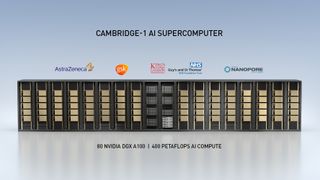Nvidia pledges to build Britain’s largest supercomputer following ARM deal
$52m Cambridge-I supercomputer will use Nvidia's DGX SuperPOD system

Following the announcement that it will buy British rival Arm for $40bn, Nvidia has pledged to build a $52m supercomputer in Cambridge, England that it plans to make available to healthcare researchers in the UK.
The company's founder and CEO Jensen Huang unveiled the plans for the new supercomputer, named Cambridge-I, at its GTC 2020 conference. Huang provided further details on how Cambridge-I will benefit healthcare researchers in the UK in his keynote speech, saying:
“Tackling the world’s most pressing challenges in healthcare requires massively powerful computing resources to harness the capabilities of AI. The Cambridge-1 supercomputer will serve as a hub of innovation for the U.K., and further the groundbreaking work being done by the nation’s researchers in critical healthcare and drug discovery.”
- We've put together a list of the best cloud computing services
- These are the best mobile workstations on the market
- Also check out our roundup of the best cloud storage services
Cambridge-I is expected to launch by the end of this year and the new supercomputer will be the 29th most powerful computer in the world as well as the most powerful in Britain according to Nvidia.
Cambridge-I supercomputer
Nvidia's Cambridge-I supercomputer will be an NVIDIA DGX SuperPOD system capable of delivering more than 400 petaflops of AI performance and 8 petaflops of Linpack performance.
Since Cambridge-I will use Nvidia's DGX SuperPOD system, the supercomputer will be able to be setup in a manner of weeks as it will be powered by 80 of the company's systems that are connected together.
While GSK and AstraZeneca will be the first pharmaceutical companies to harness Cambridge-1 for research, Guy's, St Thomas' NHS Foundation trust, King's College London and Oxford Nanopore Technologies also plan to take advantage of the system.
Are you a pro? Subscribe to our newsletter
Sign up to the TechRadar Pro newsletter to get all the top news, opinion, features and guidance your business needs to succeed!
In the past, Nvidia announced its plans to create an AI Center of Excellence in Cambridge that will serve as a hub of collaboration for AI researchers, scientists and startups across the UK. Cambridge-1 will become a part of that Center of Excellence which will expand to include additional supercomputers and support more of the country's industries.
- We've also highlighted the best workstations for professionals
Via CNBC
After working with the TechRadar Pro team for the last several years, Anthony is now the security and networking editor at Tom’s Guide where he covers everything from data breaches and ransomware gangs to the best way to cover your whole home or business with Wi-Fi. When not writing, you can find him tinkering with PCs and game consoles, managing cables and upgrading his smart home.

